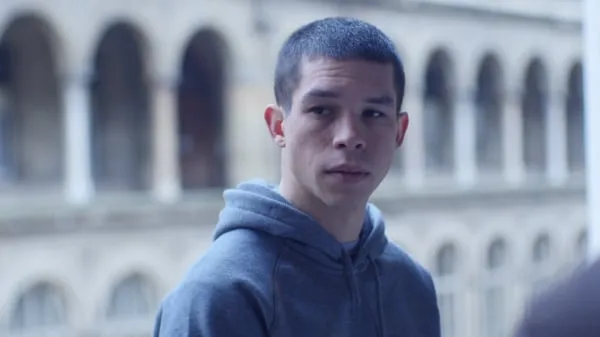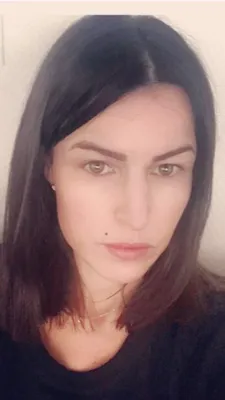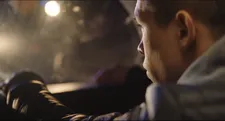 |
| Sarah Marx: 'I met Sandor Funtek at the very start of the writing process because to put words into Ulysses mouth, I needed to work with the actor. There was great work between us' Photo: Sarah Marx |
Sarah Marx fiction feature debut The Truk (L'Enkas), which tells the story of Ulysse (Sandor Funtek), a young man freshly out of prison who is desperate to make some cash in order to look after his depressed mother (Sandrine Bonnaire). Co-written by Hamé Bourokba and Ekoué Labitey it explores crime, not as a fun adrenaline rush, but as an act of desperation, fuelled by melancholy and necessity. The film had its world premiere in the Horizons section of Venice Film Festival , and I caught up with Marx to chat about it.
I'm interested in the way you handle the plot that on paper looks very familiar plot about a person who comes out of prison and can't give up their life of crime. I think you put a very interesting, humanistic, economic spin on that story. What made you want to do that?
This was movie was born out of documentary work I did in prison. Every day I followed convicts doing a theatre workshop and after this work in prison, I wanted to tell the story of a young adult getting out of prison - only to enter another prison, the one of social integration and how to make money and take care of his mum, who is depressed. He becomes the parent of his own mother.
It was really important to give a voice to those people who are struggling when they get out of prison and are heroes of everyday life and people who you generally don't look at because you're not interested.
 |
| Director Sarah Marx: 'It was really important to give a voice to those people who are struggling when they get out of prison and are heroes of everyday life' |
You don't just spend time with him. You also spend time with other characters, such as the vet who is getting them the drugs and the farmer who is acting as a go-between. When and how did you decide that you wanted to show a wider societal picture than just this one character?
Of course, I started with the character of Ulysse, it became natural and interesting to follow him in his struggle, for example, getting out of jail and he has to take care of his mum because she's depressed and needs medical care that he cannot afford. He needs a job that pays well and he's not selling the drugs just for pleasure or for fun or to buy himself a nice looking car, he needs a solution for his mum and because of his lack of choices, selling drugs is the easiest and fastest way to get out of the situation.
The Truk is about urgency. Not just Ulysse and his mum but the vet, and the others - they all have struggles. They're all linked and all in the same circle of lack of choices. They needs to eat and they need to have money and sometimes you have to do stuff like selling drugs to make 'easy money'. They're not mafia, they do it because they need to eat.
I imagine it's quite hard to stop a film on this subject from having the adrenaline aspect and keep it quite melancholy. How did you work with your cinematographer to create that distinctive mood?
The cinematographer also comes from a documentary background like me, so we wanted to be able to recreate real life and give the actors freedom. We shot in 360 degrees and used natural lights and scenery all the time. It was the same dynamic as shooting a documentary - capturing the feelings and the breath, movement and gesture of the actors. They embodied the characters well because of that freedom.
 |
| Sarah Marx: 'We shot in 360 degrees and used natural lights and scenery all the time. It was the same dynamic as shooting a documentary' Photo: Sarah Marx |
You had collaborators on the script, did that also help when it came to developing the dialogue?
It was brilliant to be able to write The Truk with two other people because we are old friends. We were able to challenge each other and keep different points of view. All the dialogue in the movie is taken from real life, it's stuff that I filmed during the documentary in prison or even when the judge sets Ulysse free at the beginning of the movie - that's real dialogue that I heard. Co-writing the script was great because we could exchange viewpoints and put ourselves in the characters' shoes during the whole process.
How did you go about casting Ulysses?
I met Sandor Funtek at the very start of the writing process because to put words into Ulysses mouth, I needed to work with the actor. There was great work between us. The mix of Sandor and Ulysse made the character come alive.
How did you find the move from the documentary to feature world. Was it freeing to be able to tell your own stories but use the documentary style?
Of course, making a fiction film sets you free and allows you to go deeper into the context. For example, when someone talks in front of the camera in a documentary, you are limited by what they say and you can't go further than that. But what's great in doing a fiction is that you can go deeper into the back story and look for explanations.
So will you do more fiction films now because it does give you that extra freedom?
I'll make more fiction but it's not incompatible with documentary making. Those kind of movies need to be really well documented and that's what I did with The Truk - a lot of research. For example, I talked to a real psychoanalyst, he's the one playing the doctor in the film. So the one doesn't exist without the other. I'll make more fiction but they are socially based movies so they need to be well-documented.
So you can do the research first through the documentary?
Yes, and the first documentary is life.
The Truk will screen at Glasgow Film Festival and New York's Rendez-Vous With French Cinema 2019.
























